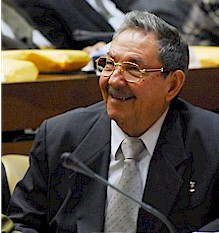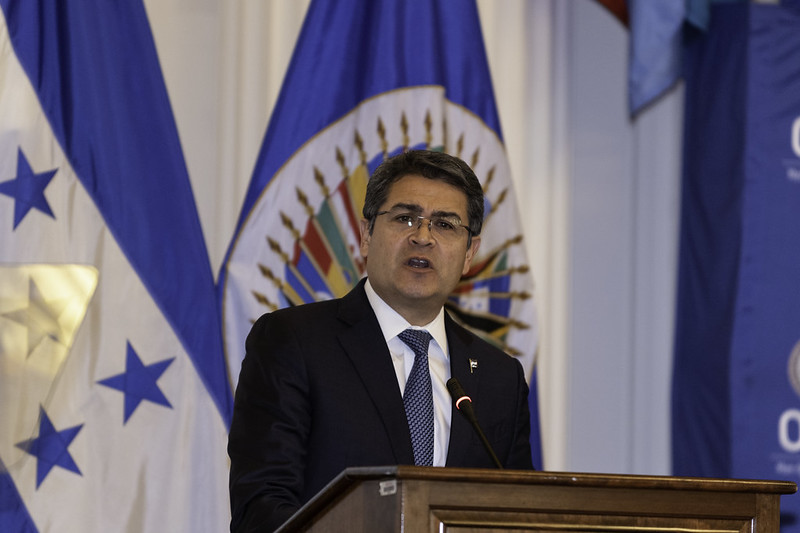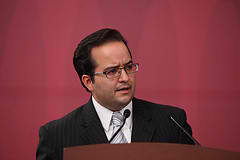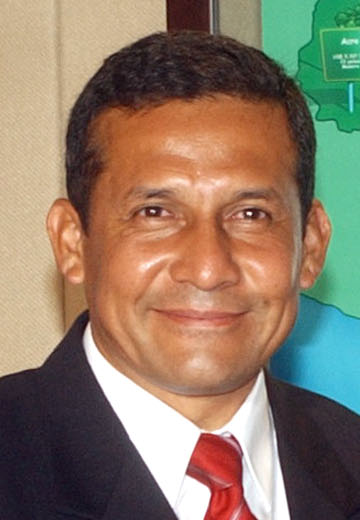
Latin America: Week in Review, Mexico
Mexican Media Outlets Set Drug War Reporting Guidelines: Calderón Praises Effort
March 25, 2011 By Staff

Money and weapons seized from Mexican drug cartels.
Today in Latin America
Top Story — Mexico’s largest media outlets agreed on a set of guidelines Thursday concerning their future coverage of the country’s ongoing drug war. The largest television networks, newspaper and radio groups in the country agreed not to publish drug cartel propaganda, glorify drug traffickers, or reveal information that could imperil police operations.
The ten-point agreement signed in Mexico City is the first of its kind in Mexico, where at least twenty-two journalists and more than 35,000 people have been killed in drug war related violence since 2006.
“We in the news media should condemn and reject the violence arising from organized crime,” the voluntary accord said, according to ABC News. It also vowed to “ignore and reject any information coming from criminal groups with the purpose of propaganda.”
President Felipe Calderón, who has criticized the media’s coverage of the drug war, praised Thursday’s agreement. His office called it “a clear example of the responsible way in which the participating media outlets treat criminal organizations and the violence they create.”
Supporters of the accord denied any government involvement in the guideline-drafting process. Among other things, the document defends the media’s right to criticize government actions against organized crime operations and it commits media outlets to treat arrested people as suspects and not presume they are guilty.
Not all of the country’s news outlets signed the agreement. Among those who declined to participate was Mexico’s Reforma, whose officials issued a statement saying their newspaper “has had its own mechanisms for editorial policy.”
Headlines from the Western Hemisphere
North America
- A Disney Cruise Line employee was reported missing during a seven-day cruise off the Mexico’s Pacific coast.
- A U.S. grand jury men indicted three men for illegally buying guns for others, including one used in the shooting death of a U.S. immigration agent in Mexico.
Caribbean
- Former Haitian dictator Jean-Claude “Baby Doc” Duvalier has been hospitalized after having chest pains, his longtime companion and associates said Thursday without giving details about his condition.
- A Cuban court is now weighing its verdict in a corruption case against former government minister Alejandro Roca Iglesias and Chilean businessman Max Marambio, Communist Party daily Granma said Thursday.
Central America
- Sandra Torres, the first lady of Guatemala announced on Thursday she had divorced her husband President Álvaro Colom for the sake of the nation, thereby hoping to skirt a law in Guatemala that blocks the president’s relatives from running for office.
- Moody’s Investors Service cut its long-term foreign currency credit rating on El Salvador one notch to Ba2 from Ba1 on Thursday, citing continued deterioration in its financial strength and reduced fiscal flexibility.
- Aggressive crackdowns on Mexican and Colombian cartels have moved drug smuggling into small Central American countries unable to combat it, officials say.
- Salvadorans on Thursday marked the 31st anniversary of the assassination of Catholic Archbishop Oscar Arnulfo Romero, whose legacy has been honored by the United Nations through the designation of March 24 as the International Day for the Right to the Truth concerning Gross Human Rights Violations.
Andes
- A Venezuelan food company set a Guinness World Record with a 1,087-pound arepa, a traditional flattened corn flour cake.
- Colombia’s economy accelerated by 4.6 percent in the fourth quarter of 2010, the government said on Thursday, sparking expectations the central bank may raise interest rates more quickly than previously thought.
- The race for president in Peru has become surprisingly uncertain, with any of the top five candidates having a shot at winning.
- Ten guerrillas were killed and four other captured in an operation against leftist FARC rebels in the western province of Chocó, a Colombian military source told EFE on Thursday.
Southern Cone
- The Inter-American Court of Human Rights ruled Wednesday that Uruguay failed to investigate the fate of María Claudia García Iruretagoyena de Gelman, a disappeared nineteen year-old activist whose newborn daughter was illegally given away in 1976 and raised as someone else.
- Five Brazilian policemen are in custody after a video that surfaced this week showed the officers shooting a 14 year-old boy in Brazil last year. The boy survived.
- Chilean President Sebastián Piñera said that Bolivia’s threatened lawsuit against Chile for access to the sea was rendered invalid by a treaty signed between the two nations in 1904.
- The IMF will send a team to Argentina next month after questions were raised about the accuracy of the national statistic agency’s data on consumer prices.
Image: WikiCommons.
Subscribe to Today in Latin America by Email





3 Comments
[…] Due to critiques like these, among others, 40 of the largest media organizations in Mexico signed the Mexico Initiative last week that regulates how the Drug War will be portrayed in media […]
[…] in the nation. Reporting on the drug war is a tough situation for Mexican journalists, with some media outlets setting coverage guidelines and others declaring a blackout on drug war […]
[…] in 1984 and has been a member of the IAPA for 27 years. It was one of 50 media outlets to sign an agreement in March that set guidelines for coveraging drug violence and establish mechanisms to protect […]
Comments are closed.